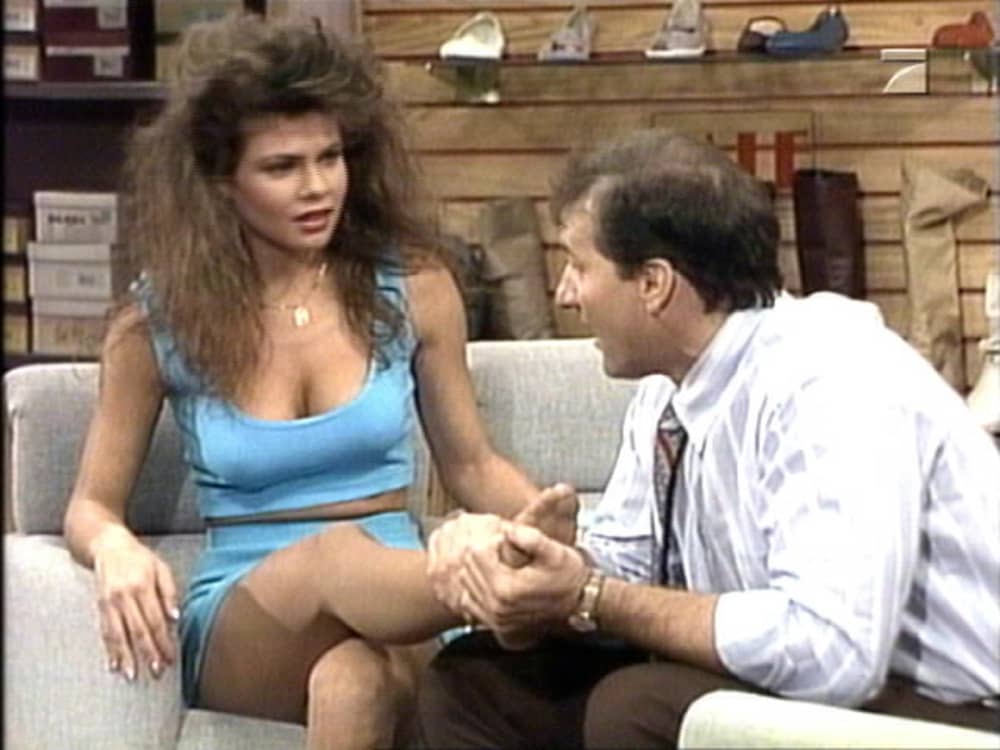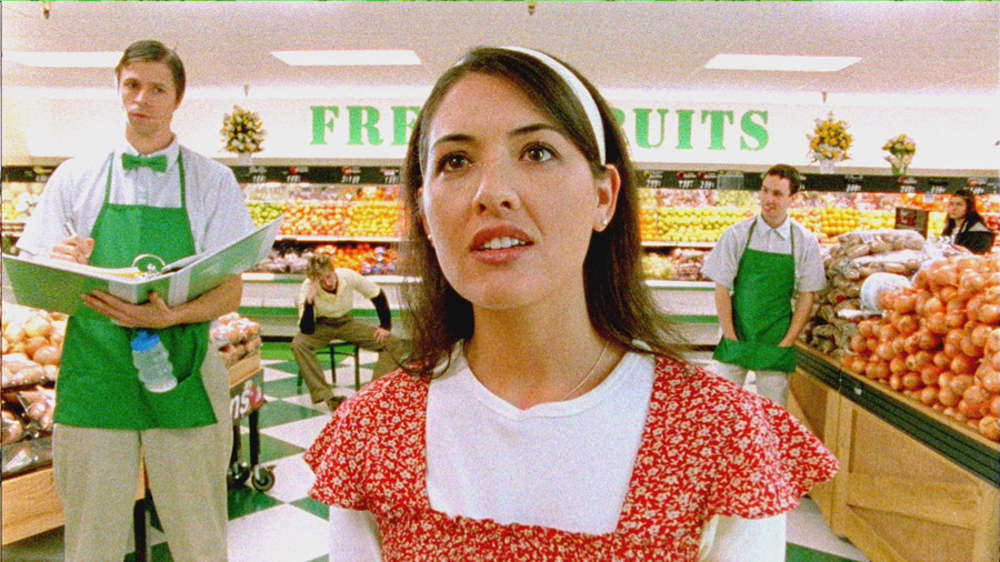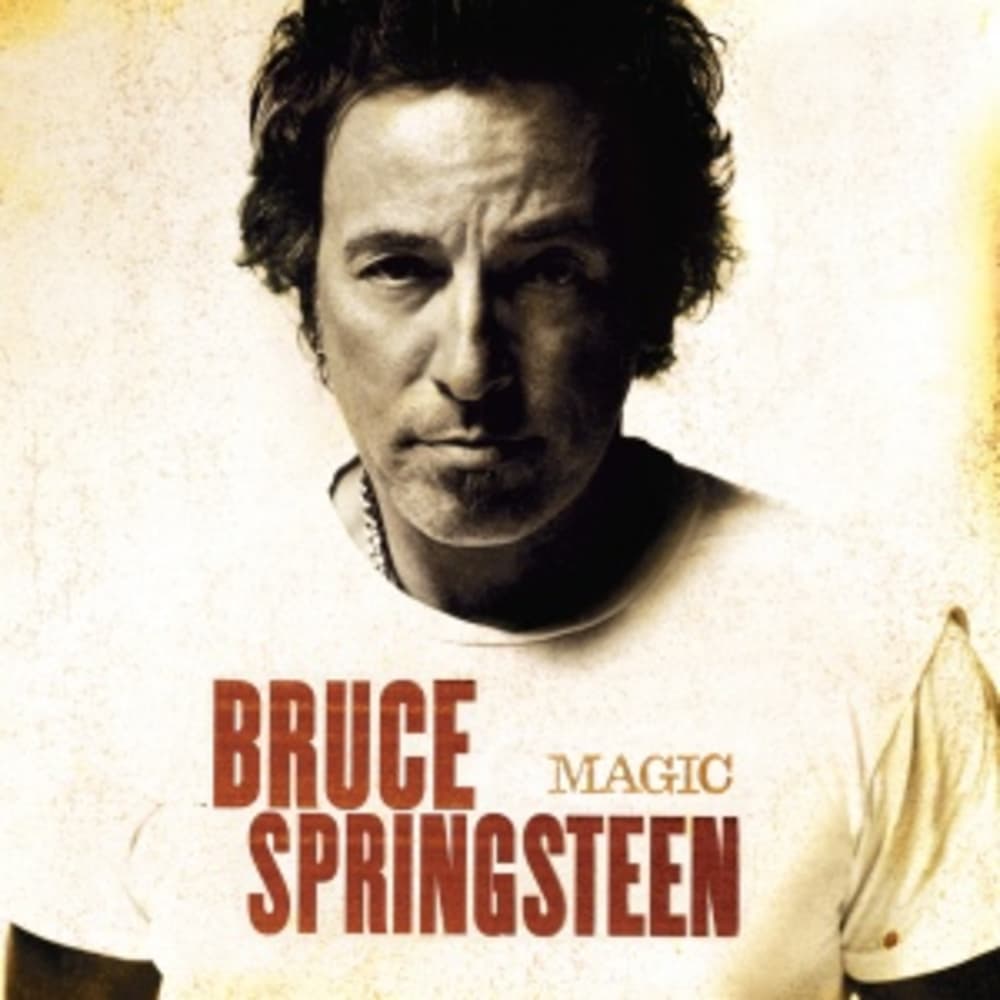No Retreat, No Surrender
"Queen of the Supermarket" is underrated, "The Rising" is overrated: The truthin Springsteen songs 130-121
 Was Bruce Springsteen thinking of Al Bundy in song No. 121?
Was Bruce Springsteen thinking of Al Bundy in song No. 121? This part of the countdown is bound to surprise you.
This part of the countdown is bound to surprise you. Springsteen finds something magical about a great supermarket too.
Springsteen finds something magical about a great supermarket too. With Bruce, it's best not to take anything for granted.
With Bruce, it's best not to take anything for granted.
When Bruce Springsteen turns his vocal cords on supermarket fantasies, Sept. 11, the silliness of sudden fame and an Al Bundy-type character, you can probably expect the results to be mixed. That's what the Ultimate Springsteen Countdown reveals as it reaches songs 130-121.
You'll probably be surprised to see "The Rising" this far out of the Top 100, but the truth is that critically-aclaimed monster force was a near miss. Of course, you might even be more shocked when you discover that what some reviewers dubbed. "The worst Springsteen song of all-time" ranks only one spot worse than "The Rising."
Hey, this is a countdown for the thinking man. Toss out those preconceptions and listen again. Then, let us know if you still disagree.
Song 130: “Queen Of The Supermarket”
Album: Working On a Dream
Adobe Flash Required for flash player.
A lot of reviewers went a bit apoplectic when this song arrived on "Working On a Dream", giving some WTF reactions and pointing it out as an example of Springsteen losing touch. I think they misinterpreted it and took it straight; if you can imagine Bruce singing it with a nod and a wink, then you’ve got the spirit.
Bruce was supposedly inspired by a trip to his local megamart, which apparently is an infrequent journey for him (imagine seeing Springsteen in the produce aisle!) Anyway, Bruce equated all of the products on display with a sort of garden of earthly delights, and even saw something sexual in the way a customer’s every desire, for food, that is, can be met.
Those of us who’ve had to deal with a line 10 deep when all we have to buy is a loaf of bread might not feel so randy, but artists just see things differently, I guess.
And so Springsteen imagines a working-class schmo who becomes enthralled with one of the checkout girls, further intermingling the desires for food and sex. (George Costanza would understand.) He never confesses his ardor, content to catch a fleeting glimpse and a smile. Anyone who could miss the humor in a line like “A dream awaits in aisle number two” isn’t listening close enough.
It helps that Bruce packages it in dream pop accompaniment. The groove sounds like it was borrowed from the Drifters, circa 1961.
And hearing the tinkling chords of Roy Bittan accompanying a shopping cart instead of a street race is quite a jolt. “Queen Of The Supermarket” is filled with amusing little quirks like that; it’s just a matter of opening both the mind and the ears to hear them.
Song 129: “The Rising”
Album: The Rising
Adobe Flash Required for flash player.
Very few Springsteen songs have been so honored. “The Rising” nabbed a pair of Grammys in 2003 and was favored to take the illustrious Best Song trophy before getting waylaid by the Norah Jones express. In the end though, I think the song can be appreciated and admired more than loved.
The subject matter is so overwhelmingly potent that right off the bat the song almost has to be perfect to do it justice. I’d say that the lyrics come pretty damn close. Springsteen takes a subtle approach here, imagining a 9/11 firefighter’s ascent in both literal and spiritual terms.
The first verse is a blow-by-blow of his climbing the stairs up into the burning building, but he veers away from this description in the second verse, relating instead how what began as an idyllic day turned into a nightmare in seconds, a telling reflection on the fragility of grace.
The final verse is when Springsteen really hits his stride, as the firefighter begins to see visions of his afterlife, religious imagery everywhere. In the last build up to the refrain, the sky flashing in front of his eyes is a juxtaposition of wonder and sorrow. There is an uplifting feel to this final verse, and this is the point when the song really feels like it achieves the Herculean feat of honoring its topic.
Unfortunately, those lyrics are tied to a melody that is stubbornly earthbound. The muscular rock that Bruce and company chose for an arrangement also feels a bit ill-suited to the task.
In that last verse you get a feel for what might have been when the instruments fall away save for a low hum behind the vocal, only to have the music ratchet up the drama into the chorus. More of this would have gone a long way.
As it is, “The Rising” always feels like a bit of a struggle for all involved. Then again, a near-miss on an attempt with such a high degree of difficulty is still a notable achievement.
Song 128: “Fire”
Album: Live 1975-1985
Unable to record due to a legal battle with former manager Mike Appel, Bruce Springsteen spent a portion of the late 70s attempting to write songs for other artists.
Freed from the constraints of having to write material that might fit into whatever thematic kick he was on while still meeting his extraordinarily high standards, Bruce started writing songs that had the immediate appeal that some of the 60s music he worshipped as a kid possessed.
“Fire” was one of those songs, originally composed with Elvis Presley in mind (and there’s a lot of The King in Bruce’s version, don’t you think?) Alas, Elvis left the earthly building before laying it down, and it ended up in the hands of The Pointer Sisters, who turned it into a No. 2 smash.
Springsteen started playing it live, as he says on the version on "Live 1975-85," “for all the girls out there.”
That version isn’t the most dynamic, and he doesn’t really ham it up like he has done at other times, which is too bad. The song itself has all the attitude and swagger in the world however, and Bruce puts that across without breaking a sweat.
“Fire” is a lot of fun, but the subtle shift it and other songs of its ilk helped to bring about in The Boss’ songwriting was no joke. It would pay off big dividends when Springsteen’s own recordings started dominating the pop charts themselves.
Song 127: “Ain’t Got You”
Album: Tunnel of Love
Adobe Flash Required for flash player.
When it was released in 1987, "Tunnel of Love" wasn’t yet the "divorce album." For all the world knew, things were rosy between Bruce and Julianne Phillips. In that context, “Ain’t Got You” seems like a rollicking ode to an unrequited love, with Springsteen hollering out the lyrics while battering his acoustic guitar and chugging away on his harp.
Maybe keen observers would have noticed the prevalent mood of the rest of the album was mostly dark, and then they could have surmised that Bruce, ever the stickler for unity, maybe had more in mind for the opener. But it was really only with hindsight that the song took on weightier implications. Knowing how his marriage turned out, the “you” he lacks suddenly doesn’t refer to an unrequited love, but instead to the supposed love of his life.
The song is also notable for Springsteen’s blunt observations on fame. Don’t forget that his own notoriety was at its zenith at the time of "Tunnel of Love," fresh as he was off the mega success of "Born In The USA" and the legendary concerts to support it.
Bruce pokes a hole in any pretensions in cutting fashion, seeing right through the silliness of fame: “And folks wanna kiss me I ain’t ever seen before.”
You can debate all you want if Springsteen’s marital woes are audible in “Ain’t Got You,” but his view on celebrity is crystal clear: “Well you’d think I might be thrilled but baby I don’t care.”
It sounds like he’d take his chances on love over fame any day of the week.
Song 126: “Last to Die”
Album: Magic
Adobe Flash Required for flash player.
Springsteen has often talked about wanting his songs to co-mingle the personal and political, and the effort to do just that is pretty overt on this grinder off "Magic." Propelled forward by outstanding bass work by Garry Tallent, “Last To Die” captures the E Street Band pounding out some brawny rock without missing the drama of Bruce’s construction.
The title phrase comes from a John Kerry speech about Vietnam. Bruce initially uses it to describe the casualties of a loveless relationship: “We don’t measure the blood we’ve drawn anymore/We just stack the bodies outside the door.”
As the song progresses however, it becomes clear that there’s more on the narrator’s radar than his crumbling romance, as the local news jars him to the core: “A downtown window flushed with light/’Faces of the dead at 5.” In the final refrain, Bruce is as obvious as he will ever get in his condemnation of warmongers: “Darlin’ will tyrants and kings fall to the same fate?”
It’s a delicate tightrope on which Bruce balances these disparate elements, and at times it does seem to tip over. In the end though, the momentum of the band and the conviction of Springsteen keep things together and “Last To Die” reaches the other side just fine.
Song 125: “Lonesome Day”
Album: The Rising
Adobe Flash Required for flash player.
When fans heard that the E Street Band would be reunited for "The Rising," they probably expected a little of the old anthemic magic, the scene-setting piano followed by the big guitars and drums, eventually leading to The Big Man on sax with the final word. They were probably a tad surprised that “Lonesome Day,” the first song on the album, sounded a bit more like a gospel hoedown.
Soosie Tyrell’s violin certainly drives the action with that probing main lick, and the backing vocals do seem to be testifying. But old fans will notice the familiar E Street style of spare verses leading to big refrains still holding sway. Just some of the stuff around the edges had changed.
Springsteen also makes the wise choice of laying off the more overtly 9/11-themed material on the first song, serving up one that doesn’t require such heavy emotional lifting right off the bat. Still, some of it does seep into the last two verses. The second verse seems to hint at bigger problems than just a broken love affair. And the final verse asks the listener to be mindful of making quick reactions to the trauma:
“Better ask questions before you shoot/Deceit and betrayal’s bitter fruit/It’s hard to swallow come time to pay/That taste on your tongue don’t easily slip away.”
Those lines turned out to be profound, on-the-mark, and also way ahead of the tide of public opinion on the whole retaliate-or-not matter. Give Springsteen credit for his insight and for the restraint to keep his feelings within the context of the song, rather than haranguing the audience until they deliberately avoid the message.
Song 124: “I Wanna Marry You”
Album: The River
Adobe Flash Required for flash player.
Springsteen’s habit of peppering his live shows with cover versions of songs from all over the musical spectrum really started to pay off when his own material began to more clearly reflect his influences. On a song like “I Wanna Marry You,” for instance, the E Street Band transcends all of these past echoes and makes the song uniquely theirs.
It is fun to hear all of the different elements coalesce here. The driving force is clearly Danny Federici’s Italian wedding organ, bobbing and swaying like a tipsy uncle. Roy Bittan’s piano fills in some of the gaps, while Bruce’s tremolo-laden guitar sleepily plays in the background. Garry Tallent’s bass is part “Under The Boardwalk," part “Stand By Me,” and the backing vocals take their cues from both doo-wop and The Beach Boys.
The music is the right fit for Springsteen’s down-to-earth, yet hopelessly romantic tale of a guy trying to do right by a lonely single mom. The narrator is refreshingly realistic about his hopes: “To say I’ll make your dreams come true would be wrong/But maybe, darlin’, I could help them along."
His heart is so far out on his sleeve it might as well be an epaulet: “There’s something happy and there’s something sad/’Bout wanting somebody, oh so bad.”
We never find out if the girl says yes. But with a proposal this romantic, backed by a band so persuasive, she’d be a fool to say no.
Song 123: “Jesus Was an Only Son”
Album: Devils & Dust
Adobe Flash Required for flash player.
A fascinating and at times downright beautiful offering off of "Devils & Dust," this song ignores the divinity of Christ and instead focuses on his humanity, particularly his interaction with his mother. There is a touching tenderness to these scenes, and Bruce shifts back and forth between quiet moments like Jesus reading as a boy or being tucked into bed by Mary, and the moments on which much of Christianity is based, such as his walk up Calvary hill with the cross.
The penultimate verse is the most curious, as it deviates from the specifics of the scene to make general ruminations about loss and wasted lives. My guess is that this was Springsteen’s way of saying that Jesus was someone’s son, just like all of the sons whose lives are being cut short due to violence or war. The inclusion of this verse, interrupting the narrative, equates the tragedies.
Bruce handles all the music here, and he does a great job with the lovely organ work and the tasteful piano. His instrumental abilities have always been the most underrated part of his game, but they’re on full display here. The lyrical stuff, which he once again swats out of the park, well, that’s a given.
Song 122: “Surprise, Surprise”
Album: Working On a Dream
Adobe Flash Required for flash player.
It may be the sunniest sounding song in the history of the group. Blasting out of the speakers with ringing guitars and in-your-face hooks, “Surprise, Surprise” may come as just that to unsuspecting longtime E Street Band followers.
There’s a little bit of "Rubber Soul"-era Beatles in there, a lot of Byrds, and a dash of any one of a million one-hit wonders with spectacularly garish names that came down the pike in the 1960s.
The lyrics, what lyrics there are outside of the oft-repeated refrain, are warm-hearted and gracious, the sound of a man loving life and wanting his partner to share in the joy. Essentially, it’s a birthday song, but the well-wishing it does is clearly meant to be a lifetime thing.
You have to love the final refrain, when Nils Lofgren, Soosie Tyrell, and Patti Scialfa each take a turn singing “Let your love shine down” amidst the day-glo orchestration. Would you believe a psychedelic E Street Band? Maybe that’s pushing it, but “Surprise, Surprise” was clearly born in the '60s.
Song 121: “Highway 29”
Album: The Ghost of Tom Joad
Adobe Flash Required for flash player.
The lovers on the run at the heart of this song could just as easily have been found rumbling through Springsteen’s Nebraska. This pair feels less like victims of circumstance than some of the other tortured souls on "The Ghost of Tom Joad." This pair has nothing to blame but their own self-destructive tendencies.
As you might expect, the instrumental backing is kept to a minimum here, just Bruce on gently plucked acoustic guitar with some atmospheric synths in the background. He sings the song almost abashedly, as if his protagonist is afraid to speak up and tell the world about his actions.
That protagonist appears to be a shoe-store clerk (Al Bundy jokes accepted and welcomed here) who meets a femme fatale and follows her lead.
The two stick up a bank and eventually attempt a getaway across the border, but crash while being chased. It seems to be a fatal accident for the woman (“She wasn’t sayin’ nothin’”), and the song ends with him in the middle of his fleeing, possibly as he’s being gunned down for his crimes (“I closed my eyes and I was runnin’/I was runnin’ then I was flyin.’”)
What’s telling about the narrative is the senselessness of it all. The characters never reveal their reasons for their behavior.
The man can’t even articulate his weakness, but he knows it’s there: “I told myself it was all something in her/But as we drove I knew it was something in me.” The road is usually a source of freedom in Springsteen songs, but here, “Highway 29” represents a road to nowhere, the final resting place for two souls whose demise hauntingly offers no moral and no answers.
